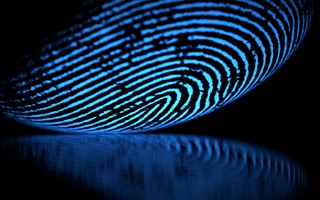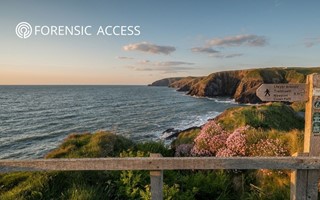Interviews March 04, 2021 3M
What attracted you to forensic science?
At university I was finishing my thesis and decided I wanted a job that used science in an applied way. I had been researching the biochemistry of sea slugs, which is much more interesting than it sounds, but there were only six or seven people in the world who cared about sea slugs, and I wanted to work in an arena that would have a more immediate impact. I was in the library one day and a friend spotted an advert for the Forensic Science Service, so I applied for it, and everything stemmed from there.
How has forensic science changed over the years?
It’s like chalk and cheese. In talks and lectures I sometimes show a slide of the Harrogate lab where I started and it looks like something out of a Sherlock Holmes novel. It was a very basic set-up in a grand house with a conservatory and a ballroom, all very weird and one million miles away from the labs we have today.
Over time forensic science has gained a huge amount, but it’s also lost something. Today the commercial element of forensics means you can only dedicate certain time and certain resource to a case. In the past we had a lot more time to think about things, police officers could send you as many items as they liked, and huge piles of evidence would soon stack up. Of course in the end it meant that we became completely overloaded, but there is a middle course.
What were the standout moments when writing your book When the Dogs Don’t Bark?
The thing that surprised me the most when reflecting on my career was that it looked like I had sat down and planed the whole thing out when I was 24, when nothing could be further from the truth! In reality it’s probably the same for anyone looking back on their career, but I was really surprised there looked like a plan when there so wasn’t!
Were you nervous leaving the Forensic Science Service, it must have been a big step?
Admittedly it was a challenging time, but one thing I have learned about myself is that I’m strangely confident and I don’t actually know why, I just think to myself ‘I can do that’. So when I left the Forensic Science Service it wasn’t a question of ‘Am I going to be able to make this work?’ , but more ‘I am going to make this work’, even though there were some fairly tough times.
What was your main reason for leaving the Forensic Science Service?
There were lots of reasons. The Home Office were really beginning to understand the value of forensic science and had taken on lots of forensic scientists and started building new labs. Lots of money was being invested in the FSS. But this meant that there was a whole group of people looking for career development at the same time. And I was one of them.
Sometimes leaving the witness box I felt uneasy about the extent to which I had been able to balance the strengths and weaknesses of my evidence. Instructed by the prosecution we tended to spend more time explaining the strengths of the evidence rather than the weaknesses.
I wasn’t alone, a lot of my colleagues felt the same imbalance, the prosecution held most of the cards. The defence didn’t really know which questions to ask to bring out the weaknesses in evidence, and I felt it would be really useful to have properly qualified forensic scientists supporting the defence.
When setting up Forensic Access I was also aware of the importance of safeguarding forensic scientists working on both sides of a case. Forensic reporting had a very narrow focus in those days and at court, the scientists were restricted to answering the specific questions they were asked. I thought scientists needed someone to come along and say ‘hang on, let’s make sure we’ve considered the evidence in the context of the case including what the defendant might have to say’. I thought it was important that they didn’t get into trouble because of some sort of misunderstanding.
What are some of the challenges facing forensics today?
There are several challenges to forensics today – mostly around funding, too tight timescales, and fragmentation of bits of work in the same case being done by different organisations so no-one has the full picture. Streamlined Forensic Reporting also continues to cause concern. In SFRs, findings are summarized so tightly that sometimes Barristers have no idea which bits they could possibly challenge. They simply don’t have enough information about the processes and findings, and because there’s no contextual information; SFRs just don’t do the job they are meant to do.
Of course I understand that there’s a question of proportionality and SFRs are designed to cut costs, bureaucracy and delays, but there must be a better way of making sure there’s enough context when needed.
Also there seems to have been a worrying shift from using SFRs to provide information to using them as evidence in courts. Our scientists in Forensic Access say it’s a real problem: the reports are just too short and without context the results can be misleading.
What are your thoughts about the future of forensics?
We are heading in a worrying direction and there’s a danger that we might neglect the wider forensics skills we need to the point where we can’t use them any more. A limited pot of money means we have to focus on where we are going to get the biggest bang for our buck, but we need to be smart.
We really don’t want forensics to switch-off its’ intellect and ‘just do DNA’ or ‘just do Digital or Fingerprints’. In complicated cases we often need to bring together different areas of expertise and take an integrated approach. It’s something we do really well at Forensic Access.
We have learned a lot over the years and a funding squeeze may ultimately mean we won’t be able to solve crimes as easily as we have been able to. Textile fibres are a great example: when working on the Pembrokeshire Coastal Path Murders the police initially insisted we only focused on DNA evidence, but in the end we wouldn’t have solved the case without textile fibres, and it was the same with Stephen Lawrence.
To find out more about the range of forensic science services offered by Forensic Access Tel: 01235 774870 to speak with a member of our casework team or fill in our contact form.
To Find out more about the benefits of The Chartered Society of Forensic Sciences visit: https://www.csofs.org/


